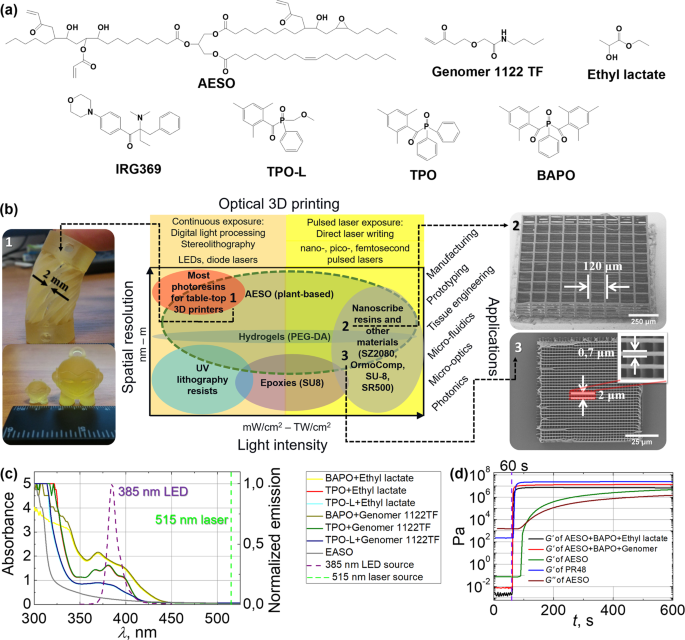(Bio-based photo-resin invented by Lithuanian researchers promises a breakthrough in rapid prototyping)
2020/9/7 リトアニア共和国・カウナス工科大学(KTU)

・ KTU が、光造形 3D プリント(O3DP)で使用できる、再生可能な原料によるバイオベースの樹脂材料を開発。
・ プリンティング中の光処理により光硬化性樹脂を積層造形する O3DP 技術は、サブミクロンからマクロサイズのオブジェクトを作製できる極めてフレキシブルで精確な 3D プリント手法。現在使用されている樹脂材料は化石燃料由来のもので、樹脂材料の原料や物理的・化学的な特性によりプリンティングのスケールが制限される。
・ 現在、3D プリンティングで使用されるバイオベース原料は、熱溶解積層による 3D プリンティングの熱可塑性樹脂のみ。バイオベースの光硬化性樹脂は市販されていない。
・ 今回開発のバイオベース樹脂材料は大豆由来のもので、超微細のナノ構造からマクロなオブジェクトを製造するマルチスケールの 3D プリンティングに使用できる。再生可能で大量購入可能な原料の利用が最大の利点。
・ 最新式のレーザーナノリソグラフィー装置と標準的なデスクトップの 3D プリンターで、同新材料によるマルチスケールの O3DP を実証。さらに、工業用ラインでチェスの駒のようなオブジェクトを小バッチで商用生産。全アプリケーションでの使用に適することを確認した。
・ 市販の 3D プリンティング装置で実証済みのため、すぐにでも商業利用可能と考えるが、安全性と経済性について研究を継続する。
URL: https://en.ktu.edu/news/bio-based-photo-resin-invented-by-lithuanian-researcherspromises-a-breakthrough-in-rapid-prototyping/
<NEDO海外技術情報より>
(関連情報)
Scientific Reports 掲載論文(フルテキスト)
A Bio-Based Resin for a Multi-Scale Optical 3D Printing
URL: https://www.nature.com/articles/s41598-020-66618-1
Abstract
Materials obtained from renewable sources are emerging to replace the starting materials of petroleum-derived plastics. They offer easy processing, fulfill technological, functional and durability requirements at the same time ensuring increased bio-compatibility, recycling, and eventually lower cost. On the other hand, optical 3D printing (O3DP) is a rapid prototyping tool (and an additive manufacturing technique) being developed as a choice for efficient and low waste production method, yet currently associated with mainly petroleum-derived resins. Here we employ a single bio-based resin derived from soy beans, suitable for O3DP in the scales from nano- to macro-dimensions, which can be processed even without the addition of photoinitiator. The approach is validated using both state-of-the art laser nanolithography setup as well as a widespread table-top 3D printer – sub-micrometer accuracy 3D objects are fabricated reproducibly. Additionally, chess-like figures are made in an industrial line commercially delivering small batch production services. Such concept is believed to make a breakthrough in rapid prototyping by switching the focus of O3DP to bio-based resins instead of being restricted to conventional petroleum-derived photopolymers



